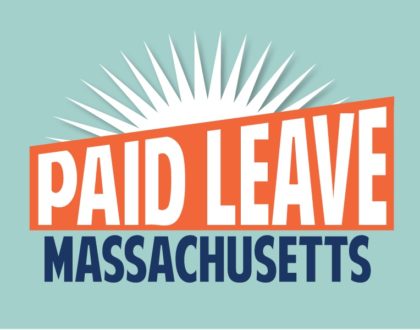An Intersectional Lens On Paid Family And Medical Leave

written by Leslie Agyemfra
w/ contributions by Morgan Cowie-Haskell
The Massachusetts Legislature is currently considering a paid family and medical leave insurance program that could impact the ability of Massachusetts workers to take leave from work while still being partially compensated for lost wages. The bills, H.2172 and S.1048, would offer 12 or 16 weeks of paid time off to care for a sick family member or a new child and 26 weeks for an employee’s own illness or injury. Employers and employees would both pay into a fund, with employers required to contribute at least half the cost. The fund would provide partial wages for workers, capped at $650 or $1,000 a week, based on the various proposals, and would allow employers to hire temporary workers to replace people on leave.
The bills propose similar models to other states like Rhode Island, California, New Jersey, New York and Washington State, who already have paid family medical leave laws. To say that it is a hot button issue in Massachusetts is putting it mildly, as paid leave has been contested and discussed for a considerable amount of time between legislators, community groups, and businesses.
The passage of paid family and medical leave by the state legislature would undoubtedly be a huge victory for all Massachusetts residents. Most workers in the state will tell you that they favor a law making it easier for people to care for themselves and loved ones when they are sick without losing out on pay. While benefits of this law may seem obvious, many people do not realize the debilitating impact unplanned time off from work has on low income workers and workers of color.
Intersectionality – first coined by Kimberlé Crenshaw in 1989 –calls for a more thorough examination of all of the unique ways people of color experience increased marginalization and oppression. This is crucial to remember in the conversation about paid family and medical leave. The federal Family Medical Leave Act (FMLA) guarantees workers up to 12 weeks of unpaid leave without the threat of job loss, after a year of service with their employer. However, according to the Center for American Progress, people of color are more likely not to be covered by FMLA.[1] The history of slavery and racism in the United States created the current climate where people of color, particularly Black women, face systemic barriers in the pursuit of financial stability and upward mobility. Cisgender women of color are less likely than cisgender white women to have access to paid maternity leave, often because they are part time workers or they are more likely to experience job instability. Because Black and Brown women are more likely to be the sole earners in their respective households, lost wages can risk loss of housing, food instability, and other economic hardships. Also while Black and Latina women are the highest demographic at risk of experiencing lost wages, they are the least likely to receive wage compensation for sick time from work. In the ongoing debate about Paid Family and Medical Leave, it is crucial that intersectionality- how different power structures interact to impact the lives of marginalized groups- is at the forefront of the conversation.
In order to make the conversation on paid leave even more inclusive, we need to name how people’s multiple identities impact their needs while in the workplace. Black and Brown women and LGBTQ people are routinely mistreated as a direct result of the ways in which our society fails to take into consideration the needs of its most marginalized members. LGBTQ people of color have higher rates of poverty than their white counterparts, and two in five queer women of color are raising children. In 2014, one third of Black and Brown LGBTQ people were without health insurance, compared to 23 percent of white LGBTQ people.[2] Also LGBTQ workers – particularly Black and Brown workers – are subjected to a traditional definition of “family” and are less likely to be granted leave from work to care for a sick partner or chosen family members. People with multiple marginalized identities face compounding economic disparities and would benefit the most from a Paid Family and Medical Leave Insurance Program that prioritizes equity.
The proposed legislation and ballot initiative for a Paid Family and Medical Leave Insurance program would cover almost all Massachusetts workers and be an important step in decreasing economic disparities along racial, gender, sexuality, and class lines. It will enforce paid leave, ensure job protection during leave and improve long-term economic stability for both employees and employers. If the legislature does not pass a reconciled PFML bill in the coming months, then paid family and medical leave will be a ballot question for voters to decide on in November. YW Boston is committed to working with our community partners, such as Raise Up Massachusetts to hold legislators accountable, and educate residents on the importance of this issue and ways they can get involved.
If you want to find out more about PFML and ways to volunteer, please visit the PFML section of Raise Up Massachusetts’ website at: https://raiseupma.org/campaigns/paid-leave/.
[1] https://www.americanprogress.org/wp-content/uploads/issues/2012/04/pdf/BousheyEmploymentLeave1.pdf
[2] https://forwardtogether.org/wp-content/uploads/2017/12/lgbtpaidleave-report.pdf
